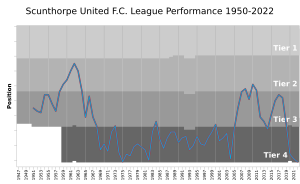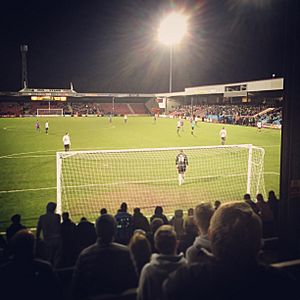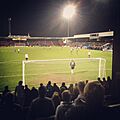History of Scunthorpe United F.C. facts for kids
Scunthorpe United Football Club is a professional association football team from Scunthorpe, England. They are often called "The Iron." The club plays in the National League North, which is the sixth level of English football.
The club started in 1899 and became a professional team in 1912. They won the Midland League twice before joining the main Football League in 1950. Scunthorpe United won promotion in 1958 and spent six seasons in the second division, which was their highest level. After some ups and downs, they had a successful period in the 2000s, winning the League One title in 2007 and getting promoted to the Championship (the second tier) again in 2009. However, they were relegated twice in a row by 2013. They earned promotion back to League One in 2014 but dropped back to League Two in 2019. In 2022, they were relegated from the Football League after 72 years, and then again to the National League North in 2023.
Contents
Club History
Early Days: 1899–1958
Scunthorpe United was formed in 1899. In 1910, they joined with another local team, North Lindsey United, to become Scunthorpe & Lindsey United. They started playing in the Midland Football League in 1912. They won this league in 1927 and 1939.
After World War II, Scunthorpe & Lindsey United kept trying to join the Football League. In 1950, they were finally accepted into the Football League. Their first game in the Football League was against Shrewsbury Town. In 1958, the club dropped "& Lindsey" from its name and became simply Scunthorpe United.
The Second Division Years: 1958–1964
In 1958, Scunthorpe United won promotion to the Second Division as champions. This was a big achievement for the club. They kept getting better for a few years, reaching their highest league position ever in 1962, finishing fourth. This happened even after their top goal scorer, Barrie Thomas, was sold to Newcastle United.
However, things changed in 1962. By 1964, Scunthorpe finished last in the Second Division and were relegated. Around this time, a loyal player named Jack Brownsword retired after playing nearly 600 games for the club.
Tough Times: 1964–1987
After being relegated from the Second Division, Scunthorpe spent the next four years in the Third Division. In 1968, they were relegated again to the Fourth Division.
In the early 1970s, the team had a small comeback. They beat Sheffield Wednesday, a top-flight team, in the FA Cup in 1970. They also won promotion back to the Third Division in 1972. During this time, a young player named Kevin Keegan was discovered and developed by the club. He later became a very famous player for Liverpool.
Scunthorpe couldn't stay in the Third Division and were relegated again in 1973. The club struggled for many years, often finishing in the bottom half of the Fourth Division. In 1980, famous cricketer Ian Botham even played for Scunthorpe United for a few years, making 14 appearances. In 1983, they got promoted to the Third Division again, but were immediately relegated the next year.
New Home, New Hopes: 1987–1997
In 1988, Scunthorpe United made history by moving to a brand new stadium called Glanford Park. It was the first time an English football club in the modern era had built a new stadium just for them.
Before moving, in their last season at the Old Show Ground, the club almost got promoted through the play-offs but lost in the semi-finals. Their first season at Glanford Park also ended in play-off heartbreak. In 1992, they finally reached the Fourth Division play-off final at Wembley, which was their first time playing at the famous stadium. However, they lost to Blackpool in a penalty shootout.
For the next four seasons, the team stayed in the middle of the Third Division table.
The Brian Laws Era: 1997–2006
In 1997, Brian Laws became the manager of Scunthorpe United. In his first full season, the team nearly made the play-offs. The next season, 1998–99, they finished fourth in Division Three and won the play-offs! They beat Swansea City and then Leyton Orient 1–0 in the final at Wembley, with a goal from Alex Calvo-Garcia. This meant they were promoted to Division Two. However, they were relegated back down the next season.
Laws led the team to the play-offs again in 2003, but they lost to local rivals Lincoln City. In 2004, Brian Laws was briefly sacked but then brought back as manager. He managed to save the club from relegation from the Football League by just four points.
In the 2004–05 season, Scunthorpe United had a great year. They were promoted to League One as runners-up, which meant they got automatic promotion for the first time in 22 years! They also had an exciting FA Cup game against Chelsea, a top Premier League team, where they led 1–0 before losing 3–1.
In the 2005–06 season, Scunthorpe managed to stay in League One, which was a big step. Young strikers Billy Sharp and Andy Keogh scored lots of goals. They also played another Premier League team, Manchester City, in the FA Cup, again leading before losing 3–1. In 2006, Brian Laws left to manage Sheffield Wednesday.
Into the Championship: 2006–2011
After Brian Laws left, the team's physiotherapist, Nigel Adkins, took over as manager. He did so well that he was given the job permanently. Fans even chanted, "Who needs Mourinho, we've got our physio!"
Despite selling a key player, Andy Keogh, the club went on to win League One in 2007 and were promoted to the Championship (the second tier of English football). They set a club record with 16 games unbeaten. Billy Sharp was the top goal scorer in the top four divisions that season with 30 goals.
Billy Sharp was sold before the next season for a club record £2 million. Scunthorpe couldn't stay in the Championship and were relegated in 2008.
The 2008–09 season was exciting. Scunthorpe played at Wembley twice! First, they reached the Football League Trophy final but lost. Then, they qualified for the League One play-offs. They beat MK Dons in the semi-finals and then beat Millwall 3–2 in the final at Wembley. This meant they were promoted back to the Championship!
In 2009–10, Scunthorpe managed to stay in the Championship, which was a big achievement. They even beat Newcastle United, who went on to win the league. Another top scorer, Gary Hooper, was sold to Celtic at the end of the season. In 2010, Nigel Adkins left to manage Southampton. His replacement, Ian Baraclough, was later sacked, and Alan Knill took over, but couldn't stop the team from being relegated back to League One.
Final Football League Years: 2011–2022
Scunthorpe hoped to return to the Championship quickly, but the 2011–12 season was tough. They finished in 18th place in League One.
The 2012–13 season started poorly. Manager Alan Knill was sacked in October 2012, and Brian Laws returned as manager. Despite some early wins, Laws couldn't stop the club from being relegated to League Two on the last day of the season. After this, chairman Steve Wharton stepped down, and Peter Swann became the new chairman.
In the 2013–14 season in League Two, Brian Laws was sacked again after a poor run. Russ Wilcox took over as manager. He led the team on an amazing 28-game unbeaten run, which was a new Football League record! This incredible run helped Scunthorpe get promoted straight back to League One. Russ Wilcox was named Manager of the Season, and striker Sam Winnall won the Golden Boot for his 23 goals.
However, Russ Wilcox was sacked early in the next season (2014–15) when the team was struggling in League One. Mark Robins took over and saved the club from relegation. That season, Scunthorpe was also involved in a record-breaking penalty shootout in the FA Cup, taking 32 penalties!
In 2016, Mark Robins was sacked, and Nick Daws and Andy Dawson took temporary charge, improving results. Later, Graham Alexander was appointed manager. He continued the team's good form, and they almost made the League One play-offs in 2016, finishing seventh.
In the 2016–17 season, Scunthorpe United had a fantastic start, being top of League One for a long time. They finished third, which meant they qualified for the play-offs. However, they lost to Millwall in the semi-finals.
In the 2017–18 season, Scunthorpe again spent most of the season in a play-off spot. Graham Alexander was sacked in March 2018 after a bad run of results. Nick Daws and Andy Dawson returned as caretakers. The team secured a play-off spot, finishing fifth. They played Rotherham United in the semi-finals but lost again.
In 2018, Stuart McCall became manager, but he was sacked in March 2019, and Andy Dawson took temporary charge again. The team was relegated to League Two. Paul Hurst became manager in May 2019. The stadium was renamed The Sands Venue Stadium. Hurst was sacked in January 2020, and Russ Wilcox returned as caretaker. The 2019–20 season was cut short due to the COVID-19 pandemic. Neil Cox became the permanent manager. In 2020–21, Scunthorpe finished 22nd, just avoiding relegation.
After a very poor start to the 2021–22 season, Neil Cox was sacked. Keith Hill took over. In March 2022, chairman Peter Swann resigned. On 15 April 2022, Scunthorpe United were relegated from League Two, ending their 72-year stay in the Football League. They finished bottom of the table.
Non-League Football: 2022–Present
Scunthorpe United started their time in the National League with a win, but then lost five games in a row. Keith Hill was sacked in August 2022. The club faced financial difficulties, with reports of unpaid bills. Tony Daws became interim manager and had a good unbeaten run, but the team was still near the bottom.
In late 2022, a local group of business people, led by Simon Elliot and Ian Sharp, agreed to buy the club. However, the club faced more financial problems, including an unpaid tax bill. Fans protested against the previous owner, Peter Swann.
In January 2023, David Hilton took over the club. He settled the tax debt, which meant the club could sign new players. Jimmy Dean was appointed manager. However, the club continued to struggle and was relegated again in April 2023, this time to the National League North.
In September 2023, David Hilton put the club up for sale. In October 2023, the club was sold to local businesswoman Michelle Harness. A new community company also bought Glanford Park, the stadium, to make sure it benefits the community in the future.
Images for kids





